2020—2021学年牛津深圳版英语七年级下册Module 3 Natural elements Unit 5 Water Period 4练习(含答案)
文档属性
| 名称 | 2020—2021学年牛津深圳版英语七年级下册Module 3 Natural elements Unit 5 Water Period 4练习(含答案) | 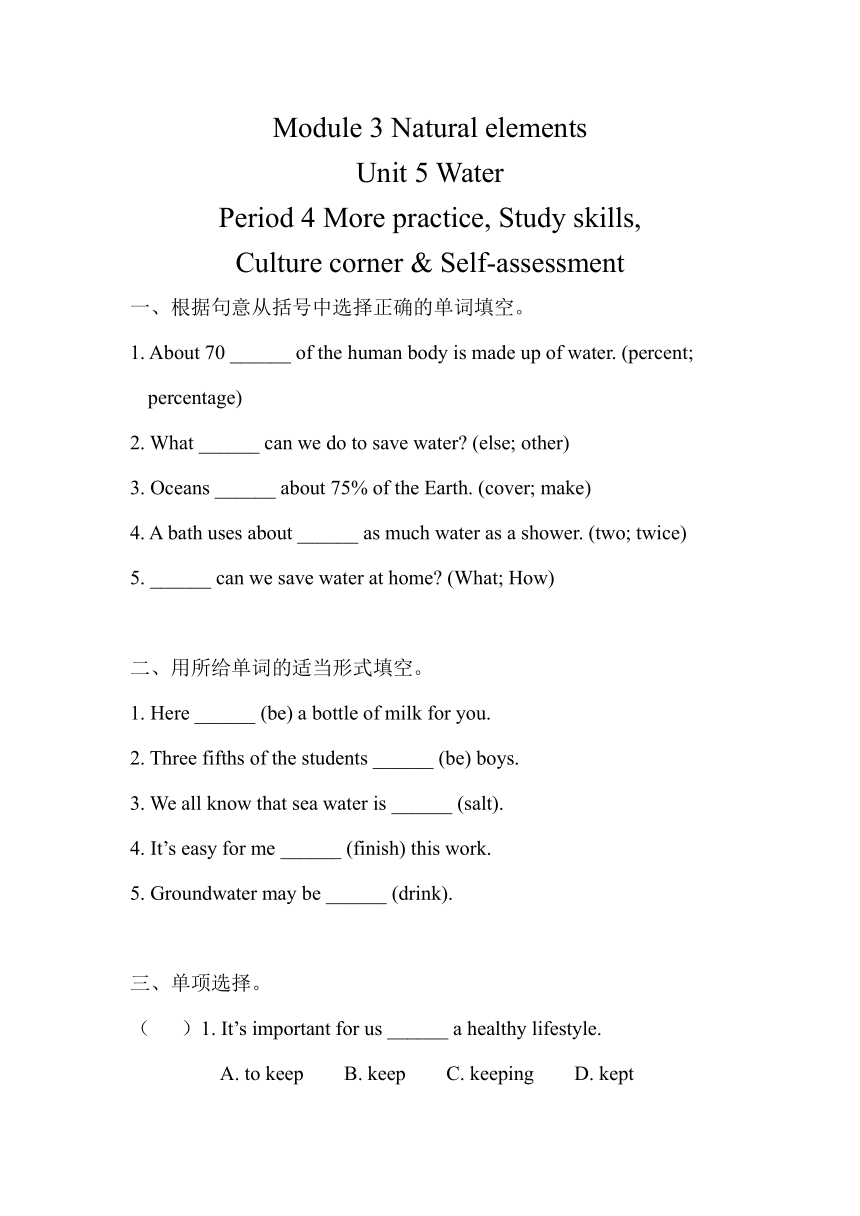 | |
| 格式 | zip | ||
| 文件大小 | 24.4KB | ||
| 资源类型 | 教案 | ||
| 版本资源 | 牛津深圳版 | ||
| 科目 | 英语 | ||
| 更新时间 | 2021-05-04 15:12:31 | ||
图片预览

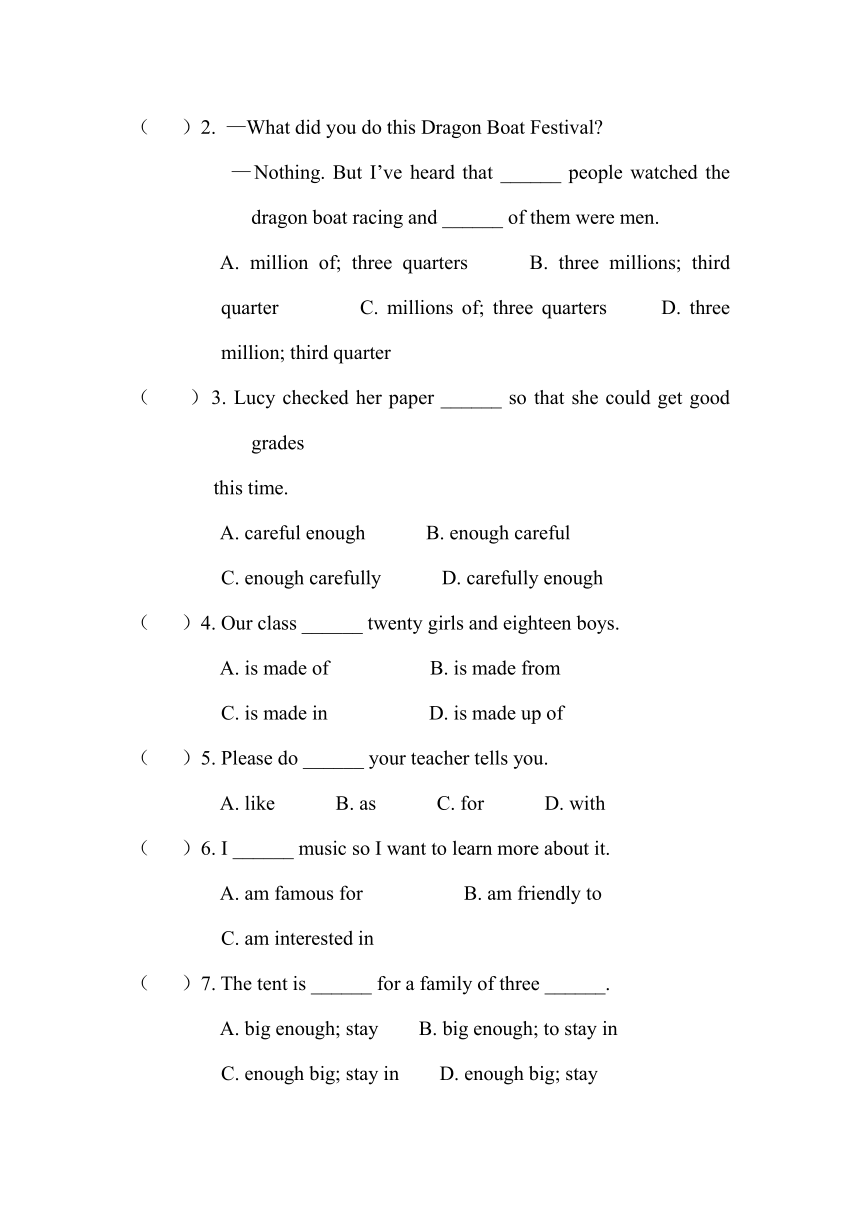
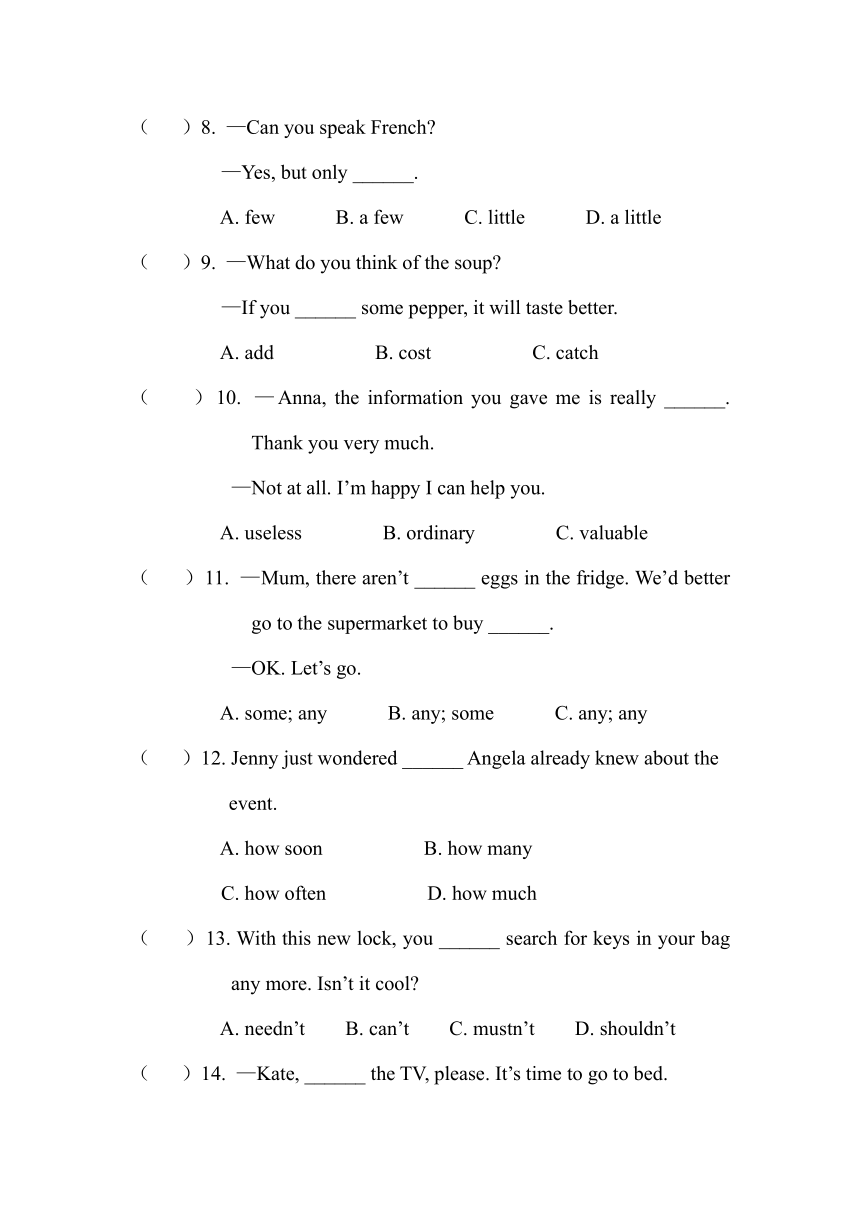
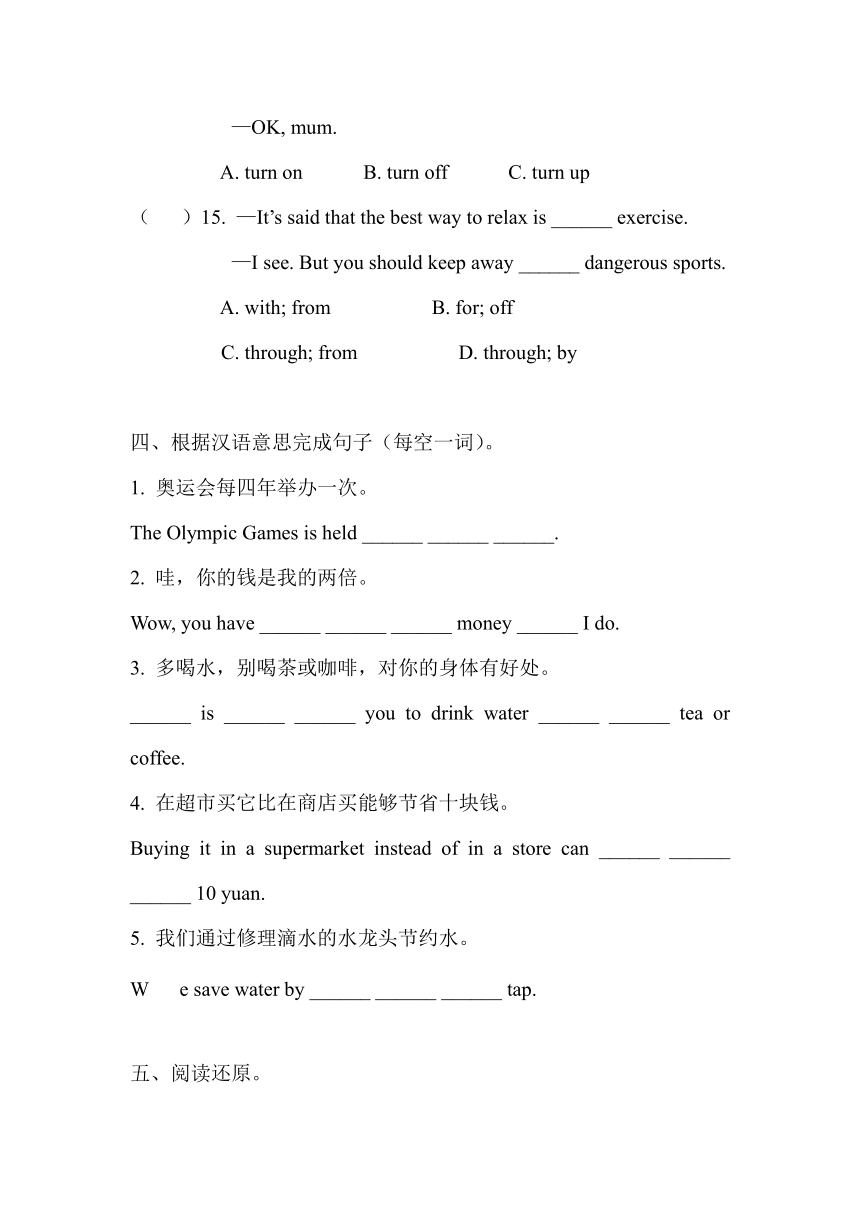
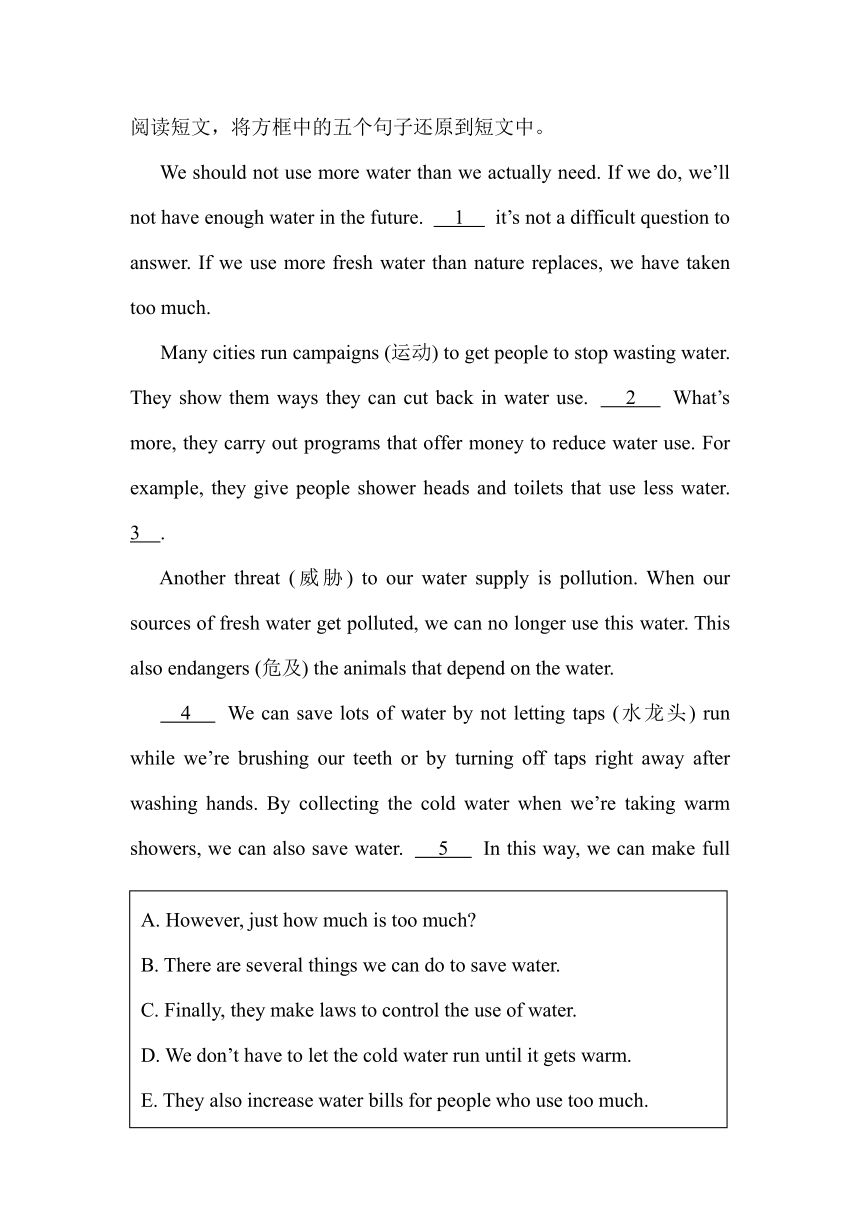
文档简介
Module
3
Natural
elements
Unit
5
Water
Period
4
More
practice,
Study
skills,
Culture
corner
&
Self-assessment
一、根据句意从括号中选择正确的单词填空。
1.
About
70
______
of
the
human
body
is
made
up
of
water.
(percent;
percentage)
2.
What
______
can
we
do
to
save
water?
(else;
other)
3.
Oceans
______
about
75%
of
the
Earth.
(cover;
make)
4.
A
bath
uses
about
______
as
much
water
as
a
shower.
(two;
twice)
5.
______
can
we
save
water
at
home?
(What;
How)
二、用所给单词的适当形式填空。
1.
Here
______
(be)
a
bottle
of
milk
for
you.
2.
Three
fifths
of
the
students
______
(be)
boys.
3.
We
all
know
that
sea
water
is
______
(salt).
4.
It’s
easy
for
me
______
(finish)
this
work.
5.
Groundwater
may
be
______
(drink).
三、单项选择。
(
)1.
It’s
important
for
us
______
a
healthy
lifestyle.
A.
to
keep
B.
keep
C.
keeping
D.
kept
(
)2.
—What
did
you
do
this
Dragon
Boat
Festival?
—Nothing.
But
I’ve
heard
that
______
people
watched
the
dragon
boat
racing
and
______
of
them
were
men.
A.
million
of;
three
quarters
B.
three
millions;
third
quarter
C.
millions
of;
three
quarters
D.
three
million;
third
quarter
(
)3.
Lucy
checked
her
paper
______
so
that
she
could
get
good
grades
this
time.
A.
careful
enough
B.
enough
careful
C.
enough
carefully
D.
carefully
enough
(
)4.
Our
class
______
twenty
girls
and
eighteen
boys.
A.
is
made
of
B.
is
made
from
C.
is
made
in
D.
is
made
up
of
(
)5.
Please
do
______
your
teacher
tells
you.
A.
like
B.
as
C.
for
D.
with
(
)6.
I
______
music
so
I
want
to
learn
more
about
it.
A.
am
famous
for
B.
am
friendly
to
C.
am
interested
in
(
)7.
The
tent
is
______
for
a
family
of
three
______.
A.
big
enough;
stay
B.
big
enough;
to
stay
in
C.
enough
big;
stay
in
D.
enough
big;
stay
(
)8.
—Can
you
speak
French?
—Yes,
but
only
______.
A.
few
B.
a
few
C.
little
D.
a
little
(
)9.
—What
do
you
think
of
the
soup?
—If
you
______
some
pepper,
it
will
taste
better.
A.
add
B.
cost
C.
catch
(
)10.
—Anna,
the
information
you
gave
me
is
really
______.
Thank
you
very
much.
—Not
at
all.
I’m
happy
I
can
help
you.
A.
useless
B.
ordinary
C.
valuable
(
)11.
—Mum,
there
aren’t
______
eggs
in
the
fridge.
We’d
better
go
to
the
supermarket
to
buy
______.
—OK.
Let’s
go.
A.
some;
any
B.
any;
some
C.
any;
any
(
)12.
Jenny
just
wondered
______
Angela
already
knew
about
the
event.
A.
how
soon
B.
how
many
C.
how
often
D.
how
much
(
)13.
With
this
new
lock,
you
______
search
for
keys
in
your
bag
any
more.
Isn’t
it
cool?
A.
needn’t
B.
can’t
C.
mustn’t
D.
shouldn’t
(
)14.
—Kate,
______
the
TV,
please.
It’s
time
to
go
to
bed.
—OK,
mum.
A.
turn
on
B.
turn
off
C.
turn
up
(
)15.
—It’s
said
that
the
best
way
to
relax
is
______
exercise.
—I
see.
But
you
should
keep
away
______
dangerous
sports.
A.
with;
from
B.
for;
off
C.
through;
from
D.
through;
by
四、根据汉语意思完成句子(每空一词)。
1.
奥运会每四年举办一次。
The
Olympic
Games
is
held
______
______
______.
2.
哇,你的钱是我的两倍。
Wow,
you
have
______
______
______
money
______
I
do.
3.
多喝水,别喝茶或咖啡,对你的身体有好处。
______
is
______
______
you
to
drink
water
______
______
tea
or
coffee.
4.
在超市买它比在商店买能够节省十块钱。
Buying
it
in
a
supermarket
instead
of
in
a
store
can
______
______
______
10
yuan.
5.
我们通过修理滴水的水龙头节约水。
We
save
water
by
______
______
______
tap.
五、阅读还原。
阅读短文,将方框中的五个句子还原到短文中。
We
should
not
use
more
water
than
we
actually
need.
If
we
do,
we’ll
not
have
enough
water
in
the
future.
1
it’s
not
a
difficult
question
to
answer.
If
we
use
more
fresh
water
than
nature
replaces,
we
have
taken
too
much.
Many
cities
run
campaigns
(运动)
to
get
people
to
stop
wasting
water.
They
show
them
ways
they
can
cut
back
in
water
use.
2
What’s
more,
they
carry
out
programs
that
offer
money
to
reduce
water
use.
For
example,
they
give
people
shower
heads
and
toilets
that
use
less
water.
3
.
Another
threat
(威胁)
to
our
water
supply
is
pollution.
When
our
sources
of
fresh
water
get
polluted,
we
can
no
longer
use
this
water.
This
also
endangers
(危及)
the
animals
that
depend
on
the
water.
4
We
can
save
lots
of
water
by
not
letting
taps
(水龙头)
run
while
we’re
brushing
our
teeth
or
by
turning
off
taps
right
away
after
washing
hands.
By
collecting
the
cold
water
when
we’re
taking
warm
showers,
we
can
also
save
water.
5
In
this
way,
we
can
make
full
use
of
water.
1.
______
2.
______
3.
______
4.
______
5.
______
六、阅读理解。
根据短文内容回答下列各题。
Once
a
traveller
wanted
to
go
across
a
desert.
He
had
walked
in
the
desert
for
three
days
without
any
water.
He
was
exhausted
(筋疲力尽的)
from
walking.
When
he
felt
hopeless,
he
suddenly
found
a
small
house.
He
pulled
his
tired
body
inside.
This
was
a
small
airless
house
and
in
the
corner
he
discovered
a
water
pump
(抽水机).
He
was
so
excited
and
went
forward
to
draw
(抽取)
water,
but
no
water
came
out
no
matter
how
hard
he
tried.
Too
tired
to
do
anything
more,
he
fell
to
the
ground.
Then
he
saw
a
small
bottle.
On
the
bottle
was
a
note,
which
read,
“You
must
pour
the
water
from
the
bottle
into
the
pump
before
you
draw
water!
Don’t
forget,
before
you
leave,
refill
the
bottle
with
water!”
He
opened
the
bottle
and
found
it
was
filled
with
water!
He
was
so
happy.
At
that
moment
he
thought,
“It
might
be
a
little
selfish
(自私的),
but
as
long
as
I
drink
the
water
in
the
bottle,
I
can
be
sure
to
leave
this
room
alive!
However,
if
I
do
as
the
note
says
and
pour
the
only
water
into
the
pump
and
no
water
comes
out,
I’ll
die
of
thirst.
Should
I
take
the
risk
or
not?”
It
was
five
minutes
later
that
he
chose
to
pour
the
only
water
into
the
pump
and
began
to
draw
water.
After
a
minute,
water
started
to
come
out!
He
made
the
right
choice.
After
he
had
drunk
enough
water,
he
refilled
the
bottle.
He
added
the
following
words
after
the
note:
Before
you
get
something,
you
should
first
learn
to
pay.
1.
What
did
the
traveller
discover
in
the
corner
of
a
small
airless
house?
________________________________________________________
2.
What
did
he
have
to
do
before
he
draw
water?
________________________________________________________
3.
How
long
did
it
take
him
to
make
a
choice?
________________________________________________________
4.
Is
the
traveller
selfish
according
to
the
passage?
________________________________________________________
5.
What
lesson
does
the
story
tell
us?
________________________________________________________
七、任务型阅读
阅读短文,按要求完成下列各题。
A
Famous
River
in
Nanjing
The
Qinhuai
River
is
the
mother
river
of
Nanjing.
It’s
divided
into
two
parts
by
the
Tongji
Gate.
One
is
the
inner
river
flowing
into
the
city
and
the
(A)
______
is
the
outer
river
which
is
regarded
as
the
moat
(护城河).
(B)
沿河的地区过去曾经是城市里最繁忙的地方。
The
Qinhuai
River
has
watched
the
cultural
development
of
Nanjing.
In
the
past,
many
famous
artists
and
writers
lived
on
the
banks
of
the
river.
And
there
are
lots
of
moving
stories
and
legends
about
(C)
them.
For
example,
Wang
Xizhi,
who
was
a
famous
calligrapher
(书法家),
once
lived
in
the
Wuyi
Alley
(乌衣巷).
That
made
the
place
well-known
and
attractive.
The
poet
Li
Shangyin
wrote
one
of
his
most
popular
poems
there.
In
(D)
______
same
place,
another
poem
Du
Mu
created
a
poem
about
the
river
to
express
different
feelings.
Nowadays,
the
Qinhuai
River
has
become
a
hot
tour
place.
(E)
It’s
a
pleasant
thing
to
take
a
boat
on
the
river.
Tea
and
local
snacks
are
served
and
traditional
Chinese
music
is
performed
both
on
the
boat
and
riverbanks.
Boating
on
the
calm
river
in
the
colorful
lights
at
night,
you’ll
feel
like
you
were
travelling
in
the
past.
1.
在文中(A)和(D)的空白处填入适当的单词。
(A)
______;
(D)
______
2.
将文中画线部分(E)改写为:
It’s
a
pleasant
thing
to
travel
on
the
river
______.
3.
将文中画线部分(B)翻译成英语:
________________________________________
4.
文中画线部分(C)指代的是:
________________________________________
5.
从文中找出两个诗人:________
________
参考答案
一、根据句意从括号中选择正确的单词填空。
1.
percent
2.
else
3.
cover
4.
twice
5.
How
二、用所给单词的适当形式填空。
1.
is
2.
are
3.
salty
4.
to
finish
5.
drinkable
三、单项选择。
1.
A
2.
C
3.
D
4.
D
5.
B
6.
C
7.
B
8.
D
9.
A
10.
C
11.
B
12.
D
13.
A
14.
B
15.
C
四、根据汉语意思完成句子(每空一词)。
1.
every
four
years
2.
twice
as
much;
as
3.
It;
good
for;
instead
of
4.
save
up
to
5.
fixing
a
dripping
五、阅读还原。
1.
A
2.
E
3.
C
4.
B
5.
D
六、阅读理解。
1.
A
water
pump.
/
He
discovered
a
water
pump.
2.
He
had
to
pour
the
water
from
the
bottle
into
the
pump.
3.
For
five
minutes.
/
It
took
him
five
minutes
(to
make
a
choice).
4.
No,
he
isn’t.
5.
Before
we
get
something,
we
should
first
learn
to
pay.
七、任务型阅读
1.
other;
the
2.
by
boat
3.
The
areas
along
the
river
used
to
be
the
busiest
places
in
the
city.
4.
many
famous
artists
and
writers
5.
Li
Shangyin;
Du
Mu
3
Natural
elements
Unit
5
Water
Period
4
More
practice,
Study
skills,
Culture
corner
&
Self-assessment
一、根据句意从括号中选择正确的单词填空。
1.
About
70
______
of
the
human
body
is
made
up
of
water.
(percent;
percentage)
2.
What
______
can
we
do
to
save
water?
(else;
other)
3.
Oceans
______
about
75%
of
the
Earth.
(cover;
make)
4.
A
bath
uses
about
______
as
much
water
as
a
shower.
(two;
twice)
5.
______
can
we
save
water
at
home?
(What;
How)
二、用所给单词的适当形式填空。
1.
Here
______
(be)
a
bottle
of
milk
for
you.
2.
Three
fifths
of
the
students
______
(be)
boys.
3.
We
all
know
that
sea
water
is
______
(salt).
4.
It’s
easy
for
me
______
(finish)
this
work.
5.
Groundwater
may
be
______
(drink).
三、单项选择。
(
)1.
It’s
important
for
us
______
a
healthy
lifestyle.
A.
to
keep
B.
keep
C.
keeping
D.
kept
(
)2.
—What
did
you
do
this
Dragon
Boat
Festival?
—Nothing.
But
I’ve
heard
that
______
people
watched
the
dragon
boat
racing
and
______
of
them
were
men.
A.
million
of;
three
quarters
B.
three
millions;
third
quarter
C.
millions
of;
three
quarters
D.
three
million;
third
quarter
(
)3.
Lucy
checked
her
paper
______
so
that
she
could
get
good
grades
this
time.
A.
careful
enough
B.
enough
careful
C.
enough
carefully
D.
carefully
enough
(
)4.
Our
class
______
twenty
girls
and
eighteen
boys.
A.
is
made
of
B.
is
made
from
C.
is
made
in
D.
is
made
up
of
(
)5.
Please
do
______
your
teacher
tells
you.
A.
like
B.
as
C.
for
D.
with
(
)6.
I
______
music
so
I
want
to
learn
more
about
it.
A.
am
famous
for
B.
am
friendly
to
C.
am
interested
in
(
)7.
The
tent
is
______
for
a
family
of
three
______.
A.
big
enough;
stay
B.
big
enough;
to
stay
in
C.
enough
big;
stay
in
D.
enough
big;
stay
(
)8.
—Can
you
speak
French?
—Yes,
but
only
______.
A.
few
B.
a
few
C.
little
D.
a
little
(
)9.
—What
do
you
think
of
the
soup?
—If
you
______
some
pepper,
it
will
taste
better.
A.
add
B.
cost
C.
catch
(
)10.
—Anna,
the
information
you
gave
me
is
really
______.
Thank
you
very
much.
—Not
at
all.
I’m
happy
I
can
help
you.
A.
useless
B.
ordinary
C.
valuable
(
)11.
—Mum,
there
aren’t
______
eggs
in
the
fridge.
We’d
better
go
to
the
supermarket
to
buy
______.
—OK.
Let’s
go.
A.
some;
any
B.
any;
some
C.
any;
any
(
)12.
Jenny
just
wondered
______
Angela
already
knew
about
the
event.
A.
how
soon
B.
how
many
C.
how
often
D.
how
much
(
)13.
With
this
new
lock,
you
______
search
for
keys
in
your
bag
any
more.
Isn’t
it
cool?
A.
needn’t
B.
can’t
C.
mustn’t
D.
shouldn’t
(
)14.
—Kate,
______
the
TV,
please.
It’s
time
to
go
to
bed.
—OK,
mum.
A.
turn
on
B.
turn
off
C.
turn
up
(
)15.
—It’s
said
that
the
best
way
to
relax
is
______
exercise.
—I
see.
But
you
should
keep
away
______
dangerous
sports.
A.
with;
from
B.
for;
off
C.
through;
from
D.
through;
by
四、根据汉语意思完成句子(每空一词)。
1.
奥运会每四年举办一次。
The
Olympic
Games
is
held
______
______
______.
2.
哇,你的钱是我的两倍。
Wow,
you
have
______
______
______
money
______
I
do.
3.
多喝水,别喝茶或咖啡,对你的身体有好处。
______
is
______
______
you
to
drink
water
______
______
tea
or
coffee.
4.
在超市买它比在商店买能够节省十块钱。
Buying
it
in
a
supermarket
instead
of
in
a
store
can
______
______
______
10
yuan.
5.
我们通过修理滴水的水龙头节约水。
We
save
water
by
______
______
______
tap.
五、阅读还原。
阅读短文,将方框中的五个句子还原到短文中。
We
should
not
use
more
water
than
we
actually
need.
If
we
do,
we’ll
not
have
enough
water
in
the
future.
1
it’s
not
a
difficult
question
to
answer.
If
we
use
more
fresh
water
than
nature
replaces,
we
have
taken
too
much.
Many
cities
run
campaigns
(运动)
to
get
people
to
stop
wasting
water.
They
show
them
ways
they
can
cut
back
in
water
use.
2
What’s
more,
they
carry
out
programs
that
offer
money
to
reduce
water
use.
For
example,
they
give
people
shower
heads
and
toilets
that
use
less
water.
3
.
Another
threat
(威胁)
to
our
water
supply
is
pollution.
When
our
sources
of
fresh
water
get
polluted,
we
can
no
longer
use
this
water.
This
also
endangers
(危及)
the
animals
that
depend
on
the
water.
4
We
can
save
lots
of
water
by
not
letting
taps
(水龙头)
run
while
we’re
brushing
our
teeth
or
by
turning
off
taps
right
away
after
washing
hands.
By
collecting
the
cold
water
when
we’re
taking
warm
showers,
we
can
also
save
water.
5
In
this
way,
we
can
make
full
use
of
water.
1.
______
2.
______
3.
______
4.
______
5.
______
六、阅读理解。
根据短文内容回答下列各题。
Once
a
traveller
wanted
to
go
across
a
desert.
He
had
walked
in
the
desert
for
three
days
without
any
water.
He
was
exhausted
(筋疲力尽的)
from
walking.
When
he
felt
hopeless,
he
suddenly
found
a
small
house.
He
pulled
his
tired
body
inside.
This
was
a
small
airless
house
and
in
the
corner
he
discovered
a
water
pump
(抽水机).
He
was
so
excited
and
went
forward
to
draw
(抽取)
water,
but
no
water
came
out
no
matter
how
hard
he
tried.
Too
tired
to
do
anything
more,
he
fell
to
the
ground.
Then
he
saw
a
small
bottle.
On
the
bottle
was
a
note,
which
read,
“You
must
pour
the
water
from
the
bottle
into
the
pump
before
you
draw
water!
Don’t
forget,
before
you
leave,
refill
the
bottle
with
water!”
He
opened
the
bottle
and
found
it
was
filled
with
water!
He
was
so
happy.
At
that
moment
he
thought,
“It
might
be
a
little
selfish
(自私的),
but
as
long
as
I
drink
the
water
in
the
bottle,
I
can
be
sure
to
leave
this
room
alive!
However,
if
I
do
as
the
note
says
and
pour
the
only
water
into
the
pump
and
no
water
comes
out,
I’ll
die
of
thirst.
Should
I
take
the
risk
or
not?”
It
was
five
minutes
later
that
he
chose
to
pour
the
only
water
into
the
pump
and
began
to
draw
water.
After
a
minute,
water
started
to
come
out!
He
made
the
right
choice.
After
he
had
drunk
enough
water,
he
refilled
the
bottle.
He
added
the
following
words
after
the
note:
Before
you
get
something,
you
should
first
learn
to
pay.
1.
What
did
the
traveller
discover
in
the
corner
of
a
small
airless
house?
________________________________________________________
2.
What
did
he
have
to
do
before
he
draw
water?
________________________________________________________
3.
How
long
did
it
take
him
to
make
a
choice?
________________________________________________________
4.
Is
the
traveller
selfish
according
to
the
passage?
________________________________________________________
5.
What
lesson
does
the
story
tell
us?
________________________________________________________
七、任务型阅读
阅读短文,按要求完成下列各题。
A
Famous
River
in
Nanjing
The
Qinhuai
River
is
the
mother
river
of
Nanjing.
It’s
divided
into
two
parts
by
the
Tongji
Gate.
One
is
the
inner
river
flowing
into
the
city
and
the
(A)
______
is
the
outer
river
which
is
regarded
as
the
moat
(护城河).
(B)
沿河的地区过去曾经是城市里最繁忙的地方。
The
Qinhuai
River
has
watched
the
cultural
development
of
Nanjing.
In
the
past,
many
famous
artists
and
writers
lived
on
the
banks
of
the
river.
And
there
are
lots
of
moving
stories
and
legends
about
(C)
them.
For
example,
Wang
Xizhi,
who
was
a
famous
calligrapher
(书法家),
once
lived
in
the
Wuyi
Alley
(乌衣巷).
That
made
the
place
well-known
and
attractive.
The
poet
Li
Shangyin
wrote
one
of
his
most
popular
poems
there.
In
(D)
______
same
place,
another
poem
Du
Mu
created
a
poem
about
the
river
to
express
different
feelings.
Nowadays,
the
Qinhuai
River
has
become
a
hot
tour
place.
(E)
It’s
a
pleasant
thing
to
take
a
boat
on
the
river.
Tea
and
local
snacks
are
served
and
traditional
Chinese
music
is
performed
both
on
the
boat
and
riverbanks.
Boating
on
the
calm
river
in
the
colorful
lights
at
night,
you’ll
feel
like
you
were
travelling
in
the
past.
1.
在文中(A)和(D)的空白处填入适当的单词。
(A)
______;
(D)
______
2.
将文中画线部分(E)改写为:
It’s
a
pleasant
thing
to
travel
on
the
river
______.
3.
将文中画线部分(B)翻译成英语:
________________________________________
4.
文中画线部分(C)指代的是:
________________________________________
5.
从文中找出两个诗人:________
________
参考答案
一、根据句意从括号中选择正确的单词填空。
1.
percent
2.
else
3.
cover
4.
twice
5.
How
二、用所给单词的适当形式填空。
1.
is
2.
are
3.
salty
4.
to
finish
5.
drinkable
三、单项选择。
1.
A
2.
C
3.
D
4.
D
5.
B
6.
C
7.
B
8.
D
9.
A
10.
C
11.
B
12.
D
13.
A
14.
B
15.
C
四、根据汉语意思完成句子(每空一词)。
1.
every
four
years
2.
twice
as
much;
as
3.
It;
good
for;
instead
of
4.
save
up
to
5.
fixing
a
dripping
五、阅读还原。
1.
A
2.
E
3.
C
4.
B
5.
D
六、阅读理解。
1.
A
water
pump.
/
He
discovered
a
water
pump.
2.
He
had
to
pour
the
water
from
the
bottle
into
the
pump.
3.
For
five
minutes.
/
It
took
him
five
minutes
(to
make
a
choice).
4.
No,
he
isn’t.
5.
Before
we
get
something,
we
should
first
learn
to
pay.
七、任务型阅读
1.
other;
the
2.
by
boat
3.
The
areas
along
the
river
used
to
be
the
busiest
places
in
the
city.
4.
many
famous
artists
and
writers
5.
Li
Shangyin;
Du
Mu
